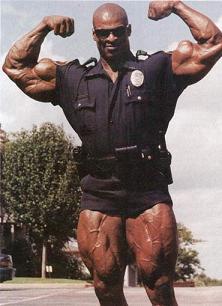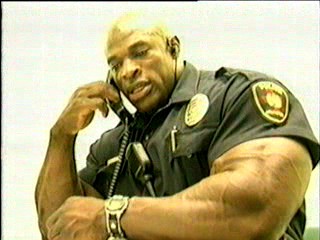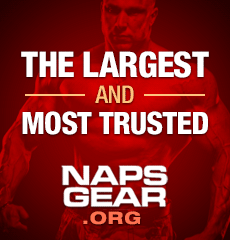Police officers on juice
 If, on bodybuilding fora people start to discuss steroids and cops, emotions come up. Like here on our own JM forum: //juicedmuscle.com/showthread.php?5877-Old-Vid-of-ROnnie-Coleman-at-work-...
If, on bodybuilding fora people start to discuss steroids and cops, emotions come up. Like here on our own JM forum: //juicedmuscle.com/showthread.php?5877-Old-Vid-of-ROnnie-Coleman-at-work-...
What I read on a forum seemed right to me: " Some people are nice, some people are assholes, some assholes become cops!! "
Or as Victor Conte said:"I think overall, it's kind of like alcohol," "If you're a jerk when you're sober, you're going to be more of a jerk when you're using."
Conte also said about the psychological effects of steroids -- including mood swings and so-called "'roid rage" -- are often overblown and can depend on how much of the drug is used. The same is true for the other side effects such as liver damage, depression and high blood pressure.
Investigations in Oregon, Ohio, Michigan, Indiana, New York and other states have in recent years found disturbing evidence of police officers abusing steroids. But Connecticut police insist they've never seen it here.
 A national expert who's been studying steroid use in all types of subcultures from athletics to the military believes "tens of thousands" of cops all across the U.S. are on such illegal drugs. But the head of the largest police union in this state, a man who spent 20 years with the Milford P.D., says the issue has never even been raised in any Connecticut disciplinary hearing he knows about.
A national expert who's been studying steroid use in all types of subcultures from athletics to the military believes "tens of thousands" of cops all across the U.S. are on such illegal drugs. But the head of the largest police union in this state, a man who spent 20 years with the Milford P.D., says the issue has never even been raised in any Connecticut disciplinary hearing he knows about.
A recent scandal in New Jersey turned up 248 public safety officials — most of them cops — who were getting steroids prescribed by a steroid-abusing doctor, and New Jersey officials responded by ordering random police drug testing. But a Connecticut State Police spokesman says his department doesn't do that.
Just last month, a federal appeals court ruled a New Jersey police chief was within his rights to order several of his officers to undergo testing for steroids, strip them of their weapons and put them on desk duty.
But state Rep. Stephen Dargan, the long-time co-chairman of the Connecticut legislature's Public Safety Committee, says he's never, ever even heard of questions about police steroid abuse being voiced in this state. "That's a new one on me," he says.
John Hoberman is a University of Texas professor who's spent 25 years studying the social implications of widespread steroid use among professional and amateur athletes, body builders, the military and police.
And statements from Connecticut law enforcement officials that they don't believe cop-steroid abuse is a significant problem here, or the fact that the issue hasn't even been raised before in this state, comes as no surprise to Hoberman.
"This has been a suppressed and under-reported story," he says of steroids and the cops. He has found most police departments "prefer to deal with [steroid abuse] as an internal matter" rather than have it become public.
Hoberman says he's collected "hundreds of reports" of such cases from around the U.S., Canada, Scotland and England.
 "This is not an isolated phenomenon — it's a country-wide phenomenon," he adds.
"This is not an isolated phenomenon — it's a country-wide phenomenon," he adds.
The biggest concern most people have over steroid "juiced" cops is the potential for increased aggression in someone who's armed and trained to use everything from pepper spray and stun guns to firearms. And one result of the New Jersey scandal is a spate of civil lawsuits claiming excessive use of force by some of the officers implicated in steroid abuse.
Connecticut has had its share of police scandals, including a recent federal investigation that found East Haven cops routinely harassed and abused Latino drivers. The feds also reported those local cops often used excessive force, but there's been no discussion of the possibility of steroid abuse.
Hoberman says so-called 'Roid Rage' isn't actually a common side effect of steroid use. "It's too simple to assume that steroids are causing violent behavior," he points out. He says steroid abuse by a police officer is often a good indicator that he (and steroid abuse is almost exclusively limited to males) is having other serious problems.
There is also the problem that a cop buying an illegal drug like steroids, either from a corrupt doctor or on the black market, "is making himself vulnerable to blackmail or pressure," Hoberman says.
At the same time, that potential for aggressive behavior is a worrisome part of the whole issue. An article in the June 2008 edition of The Police Chief, a magazine billing itself as "The Professional Voice of Law Enforcement," listed "increased self-confidence, increased activity, impaired judgment, and reckless behavior" as some of the possible side effects of steroid abuse. Not what you're looking for in dudes allowed to carry guns on the job.
According to Hoberman, many police officers who get caught in steroid scandals claim they needed to do it to bulk up and increase their physical fitness in order to handle confrontations with drug addicts and bad-ass street criminals.
"I don't think this is an adequate rationale for steroid use," Hoberman says. He says his research indicates that most cops who use such drugs are doing it for basically the same reason as everyone else: "For cosmetic purposes."
"Young men want to look good," Hoberman says, arguing most 18- to 34-year-old abusers use steroids "in order to look ripped and well defined."
Jeffrey Matchett spent 20 years as a cop in Milford and now heads AFSCME Local 15, Connecticut's biggest police union with some 4,000 members. He says questions about police steroid abuse in this state "is a surprise to me. … I haven't seen this occurring."
Matchett says there is no statewide standard for random drug testing for police in Connecticut and that the issue is left up to individual police collective bargaining units.
Articles about police steroid abuse:
- Steroid abuse among law enforcement a problem nationwide …
- Dopers in Uniform: Cops on Steroids by John Hoberman Ph.D.
- Big Guns: When Cops Use Steroids
- Police on Steroids: Threat to Criminals and Law-abiding Alike
- Steroid Abuse by Law Enforcement Personnel
- N.J. doctor supplied steroids to hundreds of law enforcement officers, firefighters
- Police Juice Up on Steroids to Get ‘Edge’ on Criminals – ABC News
.Video clips about police steroid abuse:
.Cases of possible police ‘roid rage:
- Cops Sued for Roid Rage After Tasering Senior Citizen Suffering Chest Pains
- Austin police officer Steven Willis sees deaf people signing and decides it’s public disturbance so he detains them and then arrest the girl for not obeying commands he verbalized to her back. (austinchronicle.com)
- Queens police order woman to pick up dog crap that didn’t come from her dog. When she shows them it’s too cold to be her dogs they cuff her, throw her in the patrol car, and then severely beat her. (nydailynews.com)
- Police park incorrectly. A man tells them. They break his leg .. could end up costing taxpayers $200,000 in compensation (news.com.au)
- “Don’t Taze my granny!” – Police Taser an 86-year-old disabled grandma because the old woman “took a more aggressive posture in her bed,” (courthousenews.com)
- 10-year-old boy throws a lump of dough at off duty Cicero police Sgt. John Baldini in a restaurant. Baldini uses his police training and grabs the boy by the throat before putting him in a headlock then carries him to the kitchen where he drops the hardened criminal to the floor. (9wsyr.com)
- Cop sees a man carrying a 2 year old in a neighborhood with recent burglaries, so he TASERS him, man drops child on cement when tasered and is now charged with endangering the child. (beaumontenterprise.com)
- Denver cops hi-five after tasering a homeless preacher to death (denverpost.com)
- Phoenix AZ police officer charged with Agg Assault for entering home w/o warrant, pepperspraying & tasering man, shooting his dog, then fatally shooting him w/o justification (blogs.phoenixnewtimes.com)
- Cop shoots dog on a restraining leash in the head. (youtube.com)
- Federal police officer shoots and kills dog in Anne Arundel park for playing with other dogs, local police decline to press charges (baltimoresun.com)
- National guardsman faces 16 years in jail because he videotaped police pulling a gun on him during a traffic stop (abcnews.go.com)
- Provo police taser man in his front yard ten times even though he was complying with their orders. Taunting him each time asking “How does it feel?”. (courthousenews.com)
- Police Push Disabled Woman To The Ground Then Walk Off! (youtube.com)
- Cop Tackles Pregnant Woman In Labor At Hospital For Running A Red Light! (youtube.com)
- Cop tasered three children: pushed one boy toward his bed and repeatedly tasered him. Held down a second, stunned him and threatened to sodomize him, causing the child to soil himself. A 3rd child complied with the cops’ demands that he sit on a couch, but cops handcuffed and zapped him repeatedly (chicagodefender.com)
- Florida cop facing lawsuit for choking 14 year-old who blew him a kiss. (bradenton.com)
- The cops called him uncooperative. But Radwan kept asking why they were searching him, then why they were hurting him. Finally, his questions turned to screams of pain – shackled so tightly he couldn’t walk, tasered, and then had his shoulder dislocated at the jail, all of which was caught on video (taxdollars.ocregister.com)
- Suburban NY Cops Shoot Student Without Cause, then Prevent CPR (assaulting others in process) (jonathanturley.org)
.Video clips of possible police ‘roid rage:
- Bystander video of Oscar Grant shooting
- Grandpa, Pregnant Mom Tasered at Baptism Party
- Police Brutality: Teen Girl Punched in Face for Jaywalking!
- Dash Cam: Mom Tasered While Kids Watch
- Cop Kills Dog, Tries To Buy Owner’s Silence!
- Person tased for getting out license too slowly
- Skater, Baltimore Cop Bullies Children Part 01
- Cop Knocks Out 70 Year Old Woman
- Texas cop Tasers 72 year old, great-grandmother
- Woman Shot In Face By Police
- Skater, Security Guard Canada
- Police Overreact with a Taser Gun
- Crazy Police Brutality Video Caught On Tape
- Shocking police brutality caught on CCTV
- Police Brutality: 14 yr old girl Tasered in the Head NM
- Man in Diabetic Shock Gets Tasered
- Police Overreact with a Taser Gun
- Protests, Resignation After BART Shooting
- Deaf Handicapped Man Tasered & Pepper Sprayed
- Welcome to the New World Order
Related Articles
- Tasers Kill — lethal force
- 7 Shocking Examples of Cops Getting Away With Brutal Attacks
- Cops on Roids (slog.thestranger.com)
- McKEON CALLS FOR ATTORNEY GENERAL INVESTIGATION INTO POLICE STEROID ABUSE (gloucestercitynews.net)
- Magazine for N.J. law enforcement contains ads for anabolic steroid providers (nj.com)
- Heads of largest N.J. police unions support random steroids testing for officers (nj.com)
- N.J. taxpayers get bill for millions in steroid, growth hormone prescriptions for cops, firefighters (nj.com)
- Strong at Any Cost: Five deaths in 19 months linked to steroids, Lowen's pharmacy (nj.com)
- N.J. taxpayers get bill for millions in steroid, growth hormone prescriptions for cops, firefighters (gloucestercitynews.net)
- Jersey Lawmakers Trying to Keep Cops from Juicing, Raging [Steroids] (gawker.com)
- New Jersey moves to curb steroid use by police (reuters.com)
- ‘Roid Rage: Man guilty in puppy beating death (windsorstar.com)
- N.J. lawmaker to propose bill on steroids prescriptions for law enforcement, firefighers (nj.com)
.
- Login to post comments


